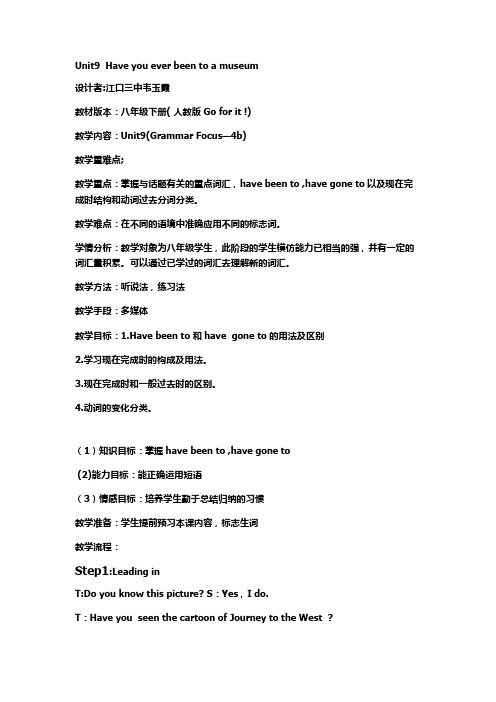2016春八年级英语下册(新目标)作业课件:Unit 9 第三课时 单元语法
2016八年级英语下册第三、四单元词组短语汇总

2016八年级英语下册第三、四单元词组短语汇总2016ц?uint3 ?1. UFO2. barber abbr.n.锛堜负鐢峰瓙鏈嶅姟鐨勶級鐞嗗彂甯?鐞嗗彂搴?n.n.鍗у;n.鍘ㄦ埧n.?v.(buy 鐨勮繃鍘诲紡) v.鐫€闄?v.(get 鐨勮繃鍘诲紡) n.;conj.褰撯€︹€︾殑鏃跺€?n.缁忓巻;浣撻獙 3. barber shop 4. bathroom 5. bedroom 6. kitchen 7. get out 8. cut 9. alien 10. bought 11. land 12. got 13. shirt 14. take off 15. while v.鍓?16. experience 17. imagine 18. strange 19. follow 20. amazing 21. kid 23. climb 24. jump 25. shout 26. rode 27. Memphis 29. ran 22. scared v.?adj.濂囨;闄岀敓鐨?v.璺熼殢;杩介殢adj.?adj.鎭愭儳鐨?v.鏀€鐧?鐖?v.璺宠穬v.鍛煎枈;鍛煎彨v.寮€鐜╃瑧;鎴忓紕;娆洪獥v.(ride 鐨勮繃鍘诲紡) ??閫冭窇锛涜窇鎺?adv.浠讳綍鍦版柟杩涙潵v.鍙戠敓n.浜嬫晠鍖椾含鍥介檯鏈哄満n.椋炴満v.(hear 鐨勮繃鍘诲紡) adj.鐜颁唬鐨?鐜颁唬鍖栫殑v. and n.璋嬫潃;鍑舵潃n.杩愬姩鍦?鎿嶅満adj.鏄庝寒鐨?鍙戜寒鐨?n.閽?閾?闂ㄩ搩v.(ring 鐨勮繃鍘诲紡) v.(tell 鐨勮繃鍘诲紡) v.鍏抽棴n.瀵傞潤;娌夐潤鍙戠敓v.鏉€姝?28. train station 30. run away 31. anywhere 32. met 33. come in 34. happen 35. accident 37. plane 38. heard 39. modern 40. kill 41. murder 43. bright 45. bell 46. rang 47. told 48. close 49. silence 50. take place v.(run 鐨勮繃鍘诲紡) v.(meet 鐨勮繃鍘诲紡) 36. Beijing International Airport 42. hear about 44. playground 51. recent adj.鏈€杩戠殑锛涜繎鏉ョ殑52. World Trade Center 53. destroy 54. terrorist 55. meaning 56. as s 57. became 58. flight 59. earth 60. hero 61. flew n.鎭愭€栧垎瀛?n.鎰忔€?鍍忊€︹€︼紙涓€鏍凤級v.(become 鐨勮繃鍘诲紡) n.鍦扮悆n.鑻遍泟v.(fly 鐨勮繃鍘诲紡) v.鐮村潖锛涙瘉鍧?n.锛岀彮鏈?unit4 ?1. mad 3. snack adj.寰堢敓姘旂殑锛涙皵鎰ょ殑adv.鍐嶄篃锛堜笉锛夛紱锛堜笉锛夊啀锛?n.灏忓悆闂存帴2. anymore 4. direct speech 5. reported speech 6. first of all 7. message 8. pass on 9. suppose 棣栧厛n.娑堟伅;淇℃伅浼犻€?v.鍋囧畾;璁や负;鏈熸湜琚?adj.?n.栫埗鎴愮哗鍗?adj.绁炵粡绱у紶鐨?涓嶅畨鐨?n.淇″皝v.鍥炴潵锛涜繑鍥?n.瀛︽湡?10. be supposed to 11.hard-working 12. do well in 13. grandfather 14. in good health 15. report card 16. nervous 17. envelope 18. return 19. semester 21. true 鍦ㄢ€︹€︽柟闈㈠仛寰楀ソ20. Chinese Young Pioneer adj.鐪熷疄鐨?22. disappointing 23. lucky 25. hers 26. own 28. poor 29. village 31. graduate 32. volunteer 34. rural 35. area 36. meter 37. sea level 38. thin 39. ate adj.?adj.骞歌繍鐨?pron.锛堝悕璇嶆€х墿涓讳唬璇嶏級濂圭殑adj.?鍏嬫湇锛涙仮澶嶏紱鍘熻皡adj.?n.涔℃潙鍖椾含澶уn.澶у笟鐢?n.蹇楁効鑰?鏁欒偛閮?24. copy v.澶嶅埗;27. get over 30. Peking University 33. The Ministry of Education adj.涔′笅鐨勶紝涔℃潙鐨?n.鍦板尯;鍦板煙n.绫?娴峰钩闈?adj.绋€钖勭殑v.(eat 鐨勮繃鍘诲紡) adv.骞歌繍鍦?n.鍐冲畾;鍐冲績n.涓堝かn.瀹胯垗楂樹腑鎵撳紑n.褰卞搷v.鍥炴潵;杩斿洖n.瀹朵埂;鏁呬埂鐓ф枡锛涚収椤?n.杈圭晫锛岃竟澧?40. fortunately 41. decision 42. husband 43. dormitory 45. Open up 46. start 48. return 50. care for 51. border 47. influence 49. hometown 44. senior high school n.寮€濮?寮€绔?52. UNICEF(United Nations International Children鈥檚Emergency Fund) addr.鑱斿悎鍥藉効绔ュ熀閲戜細53. WWF(World Wildlife Fund) 54. Greenpeace abbr.涓栫晫閲庣敓鍔ㄧ墿鍩洪噾浼?鈥滅豢鑹插拰骞斥€濈粍缁?55. danger n.鍗遍櫓。
英语人教版八年级下册Unit9Grammar -focus(语法课)

Unit9 Have you ever been to a museum设计者:江口三中韦玉霞教材版本:八年级下册( 人教版 Go for it !)教学内容:Unit9(Grammar Focus—4b)教学重难点;教学重点:掌握与话题有关的重点词汇,have been to ,have gone to以及现在完成时结构和动词过去分词分类。
教学难点:在不同的语境中准确应用不同的标志词。
学情分析:教学对象为八年级学生,此阶段的学生模仿能力已相当的强,并有一定的词汇量积累。
可以通过已学过的词汇去理解新的词汇。
教学方法:听说法,练习法教学手段:多媒体教学目标:1.Have been to 和have gone to 的用法及区别2.学习现在完成时的构成及用法。
3.现在完成时和一般过去时的区别。
4.动词的变化分类。
(1)知识目标:掌握have been to ,have gone to(2)能力目标:能正确运用短语(3)情感目标:培养学生勤于总结归纳的习惯教学准备:学生提前预习本课内容,标志生词教学流程:Step1:Leading inT:Do you know this picture? S:Yes,I do.T:Have you seen the cartoon of Journey to the West ??S:Yes ,I have/No , I haven’t.T:Have you read Alice in Wonderland yet?S:Yes, I have ./No, I haven’t.T:Have you ever been to Guilin?S:I have been there twice.1.教师引导学生对already 和yet 做复习回顾,并即刻造句使用。
2.讲述have been to 和have gone to 的含义,以及遇到地点副词时省略to,并引导学生造句。
八年级英语下册 Unit 9 Have you ever been to a museum Section A(3a3c)课后作业 (新版)人教新目标版

Unit 9 Have you ever been to a museum一、根据句意及汉语提示完成单词1.This is a boat ________ (短途旅行)with a Disney theme.2.There is ________ (快的)population growth in this country.3.Many people of Taiwan came from Guangdong ________(省).4.We can organize more ________(社会的) events.5.He is interested in ________ (德国的)history.二、根据汉语意思完成课文原句6.让我们今天去某个不同的地方。
Let's go ________ ________ today.7.你曾经去过太空博物馆吗?________ you ever________ ________ the space museum?8.它十分有趣,不是吗?It's really interesting, ________ ________?9.技术进步得如此之快真是令人难以置信!It's ________ that technology has ________ in such a ________ way!10.它还鼓励政府和社会群体思考将来改进马桶的方法。
It also ________ governments and social groups ________ ________ ________ ways to improve toilets in the future.三、根据句意及首字母提示完成单词11.—I want to take some photos. Can I use your c________?—Sure, here you are.12.She makes great p________ in her English with the help of her English teacher. 13.My father often e________ me to face the difficulty.14.His grandfather enjoys c________ old things very much.15.I like Jackie Chan best because he always has p________ acts in his movies.四、选择恰当的单词填空16.Anna's excuse for being late was ________(unbelievable/believable).Her teacher was angry with her.17.It's ________ (unusual/usually)for the flowers to come out in winter.18.It is ________(peace/peaceful) in the countryside at night.19.The little bird can eat by ________(it/itself).20.—Where is the nearest ________(toilet/tourist)?—This way, please.五、用括号内所给词的适当形式填空21.He ________ ever ________ (be) to the history museum several times. 22.(2015·兰州)He ____________(not come) yet. What do you think has happened to him?23.—Excuse me. Have you ________ (see) my pen?I ________ (put) it on the shelf a moment ago.—Oh, yes, I have. I'm sorry I forgot _______ (give) it back to you. 24.(N)—Where is Mr. Wang?—He ________________ (go) to the library. He wants to borrow some books.25.His parents encourage him ________ (study) hard.六、从方框中选出合适的短语并用其适当形式填空28.Zhang Jian ____________in his math. His teacher and parents are happy. 29.—How did you visit your uncle last week?—I ____________.30.____________ old people exercise in the park every day.七、单项选择31.(2016·苏州)Steve Jobs was full of________—always coming up with new ideas which led to great changes in society.A. instructionB. invitationC. introductionD. invention32.The policemen ________ a wall along the river to stop children from falling into it.A.put on B.put upC.put off D.put away33.(2016·哈尔滨)As middle school students, we should ________to protecting our school environment.A. make a contributionB. make a decisionC. make progress34.Music and lighting are used to encourage shoppers ________more.A.buy B.buyingC.to buy D.will buy35.(2015·龙东)He has never been to Beijing, ________?A.hasn't he B.has heC.doesn't he36.(2015·威海)—Dad, where is Mom?—She ________ the supermarket.A.has gone to B.has been toC.is going to37.(中考·贵阳)—Have you read today's newspaper?—Yes. It's really boring. There is ________ in it.A.something new B.nothing newC.anything new38.Lily is ________ that everyone in our class likes her.A.so a beautiful girl B.so girl a beautifulC.such a beautiful girl D.such beautiful a girl39.(2015·福州)—So many beautiful flowers! I can't decide ________ for my mom.—For Mother's Day, it can't be better to take some carnations(康乃馨).A.when to chooseB.which to chooseC.how to choose40.Who ________ the telephone many years ago?A.found out B.discoverC.looked D.invented八、根据汉语完成句子41.我不知道如何做饭。
新目标(人教) 八年级下册英语教学课件 Unit9 Section A(GF-4c)

可数名词时,意为“德国人”,其复数形式为 Germans。
➢I know a little German. ➢There are a few Germans in our school. 【拓展延伸】Germany 作名词,意为 “德国”。 ➢My best friend comes from Germany.
I’ve been to the art museum many times.
I’ve never been to a water park.
Yes, I have. I went there last year./ No, I haven’t.
Me, too. And I’ve also visited the nature museum.
adj. 德国的;德语的;德国人的 n. 德语;德国人
There are some special German paintings there right now.
B: Sure. When do you want __t_o_g_o__ (go) ?
5. A: Have you eห้องสมุดไป่ตู้er __v_i_si_t_e_d__ (visit) the history museum?
新目标(人教)八年级下册英语 作业课件 Unit 9 单元语法专项

C.go
D.went
由句意可知是指去过某地,故选 A。
( C )4.—I'm sorry.There was too much traffic on
the road. —Don't be late again.The meeting
for 15
minutes. A.has begun
B.has stopped
Unit 9 Have you ever been to a museum?
单元语法专项
单元语法精讲
现在完成时的用法(二) 1.现在完成时表示“经历”的用法 现在完成时可表示从过去直到现在为止的生活经历,常 用 never(从不),ever(曾经),once(一次),twice(两次),three times(三次)等作状语,可以用 how many times 提问。如:
have/has been in 的适当形式填空。
1 . He has been to
Shanghai twice.He
doesn't want to travel there any more.
2 . My mother
has gone to
the
supermarket.She isn't at home now.
◆have/has been to 表示“已去过(某地)”,现在 已经回来了,人在说话场地。
Mr.Li has been to the place of interest.Let's go and ask him something about it.李先生曾去过那个旅 游胜地。让我们去向他了解一下相关情况。
has Jim been in
人教八年级下册Unit 9 Section A Grammar Focus-4c(共34张PPT)

A. went to В. has gone to C. has been to D. has been in 5.一Paris is a wonderful place.
--So it is. I__A_____there twice.
You can __t_a_k_e_ (take) a ride on the boat for several days and eat and sleep on it. On the boat, you can ___sh_o_p__ (shop) and have Disney parties before you __a_r_r_iv_e_ (arrive) at the Disney island.
an amusement park with a special theme 在公园里走动 walk around the park 船上旅行 a boat ride=take a ride on the boat 几天 several days 一些重要的东西 something important
A. have been B. have gone C. went D. will 6. Where is Zhang Hua?
He ___B____Beijing to see his parents and he’ll be back
tomorrow. A. has gone to В. has been in C. has been to
forms of the verbs in brackets.
Most of us _h_a_v_e_s_e_en_ (see) Mickey Mouse, Donald Duck and other famous Disney characters in cartoons before. But have you ever ___b_ee_n__(be) to Disneyland? Disneyland ___i_s__ (be) an amusement park with a special theme-Disney characters and movies.
人教版英语八年级下册Unit9语法复习课件(共49张PPT)
在某地待了多长时间。
去了某地(还没回来);
01
03
02
去过某地(去过已回来);
1、---- May I speak to Mr.lee? ---- Sorry, he ______ Harbin. He _____ the city for two days.
二、短暂性动词与延续性动词
苍天啊!动词为什么还要分 短暂性动词和延续性动词!!!
二、短暂性动词与延续性动词
1. 延续性动词表示动作能够延续,如 learn, work, know, walk, keep, read, live, stay...
表达现在完成时时,可以和表 示一段时间的状语连用。
2. 非延续性动词也称为终止性动词、瞬间性动词,表 示这种动作发生后在较短时间内就结束,不能延续。如 open, die, begin, finish, come, move, borrow, lend...
(since 2 hours ago). The cat has already been dead for 2 hours.
常见非延续性动词与延续性动词的转化对照表:
短暂性动词 leave
begin/start buy
borrow/lend die join
延续性动词 be away (from)
现在完成时的构成 否定句:主语 + haven'/hasn't+done
I haven't seen the film yet.
1. I __h_a_v_e_n_'t_f_i_n_is_h_e_d(not finish)my homework. Can you help me? 2. He__h_as_n_'_t _p_a_ss_e_d(pass)the exam since he didn't finish his homework.
八年级英语新目标下Unit9课件
already:“已I经ha”v通e 常alr用ea于d肯y r定e句ad中t,h放is在bo句o中k.。 有时,也用在疑问句中表示惊讶。
Have you eaten up all the food already ?
Yet:
“仍然,还 ” 用在疑问句和否定句 中,放在句末。
I haven’t read this book yet . Have you had breakfast yet ?
ever never
“曾经”通常用于疑问句和 肯定句中,放在句中。 I have ever seen this film.
Have you ever been to the USA ?
__f_o_r __two days
__s_in_c_e__1997
__si_n_ce__yesterday
__fo_r___two weeks
afternoon
___s_in_c_e _three years
__si_n_ce__I came here ago
__si_n_ce__last Sunday __s_in_c_e__ last month
现在完成时的“完成”和“未完成”用法
6. 现在完成时表示现在之前已完成的动作,虽 然其效果或影响仍然存在但已不再继续,但是 有一些现在完成时的句子,在后面加上for+一 段时间,则现在完成时的动作就表示延续性.
Thomas has studied Russian. (现在不再学俄 语) Thomas has studied Russian for three years. (=Thomas began to study Russian three years ago, and is still studying it now.(同第2点用法 第一个例句)
新目标八年级英语(下)Unit9现在完成时
Detail
Provide sentences in English that use the present perfect tense and ask students to translate them into their native language, maintaining the correct tense usage. Then, provide sentences in the student's language that use the present perfect tense and ask them to translate them back into English.
finished."
usage
• Time Reference: The present perfect tense is used to refer to an action or event that has occurred up to the present moment. It can also be used to express an action that began in the past but is still relevant or ongoing in the present.
Examples
"Have you ever been to Europe?", "Has she ever tried sushi?".
The marker words and
03 time adverbs in the present perfect tense
Sign words
"have/has + -ed participle"
人教版八年级英语下册《unit9语法学法指导》(共24张ppt)
方法2:归纳法
Has Jenny eevveerr been to …?
A.
B.
Yes, she has.
No, she hasn’t.
She has been to the Great Wall. She has never been to Shanghai.
_e_v_e_r__常用于现在完成时的一般疑问句,放在主语的后面,
去过某地(已经回来)
标志词:once, twice, three times… ever, never, just…
去了某地 (还没回来)
规律:主语一般不用第一、第二 人称代词
在某地(强调在某地呆了多长时间)
have been in
标志词:how long, for, since
Summary
情景法
(表示在某地呆了多长时间)
has been to has gone to
has been in
have(has)been to have(has)gone to have(has)been in
去过某地(已经回来)
去了某地(还没回来)
在某地 (表示在某地呆 了多长时间)
Hi, I am Tom. I love travelling. I have been in Singapore since last Sunday. I have been here for a week.
1._H_a_s__Jo_h_n__e_v_e_r_b_e_e_n_t_o_A_m__e_r_ic_a_?_ 2. J_e_n_n_y__h_a_s_n_e_v_er__b_e_en__t_o_L_o_n_d_o_n_._
3. _S_al_l_y_h_a_s_b_e_e_n_t_o_A__u_st_r_a_li_a_. _____
